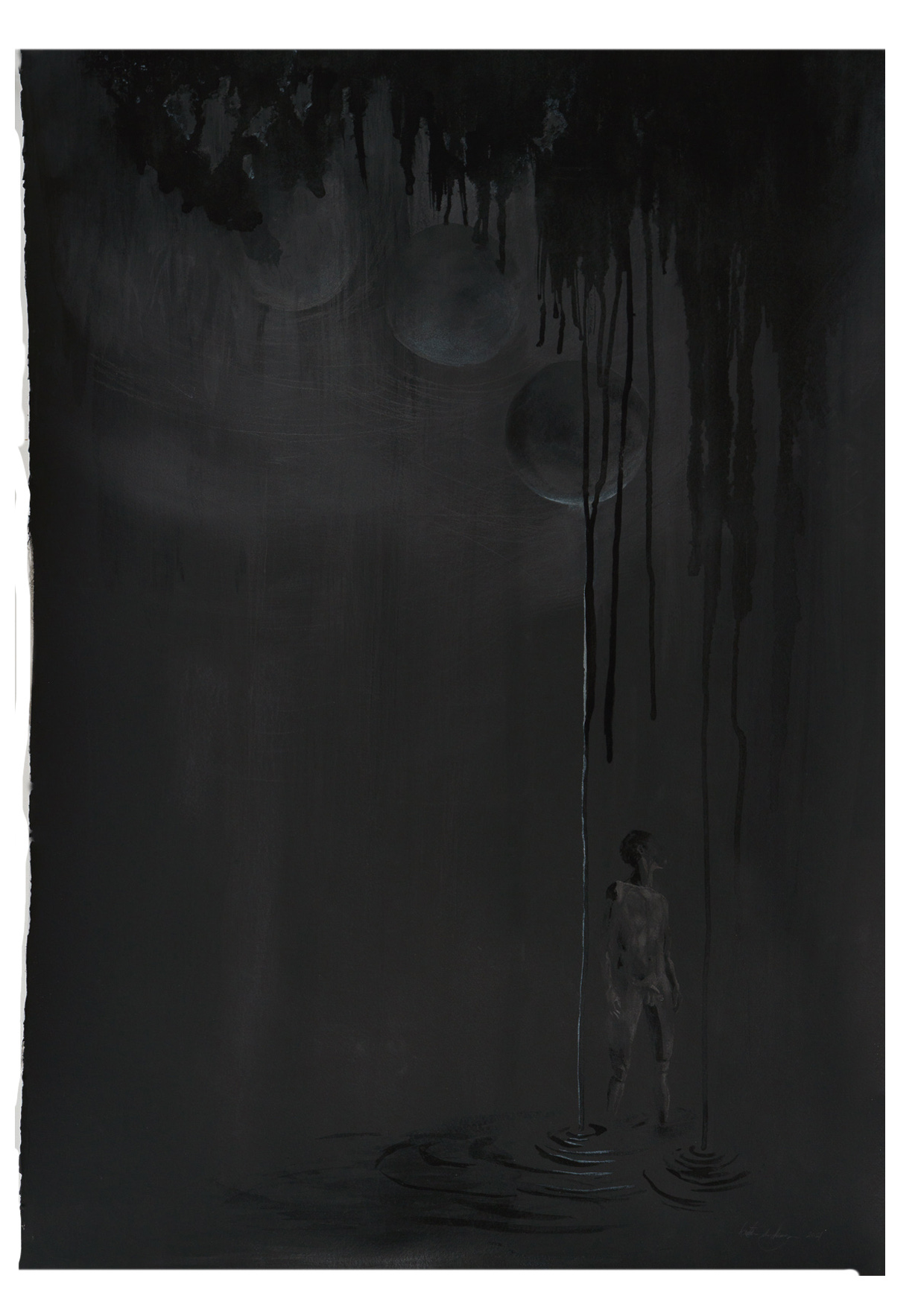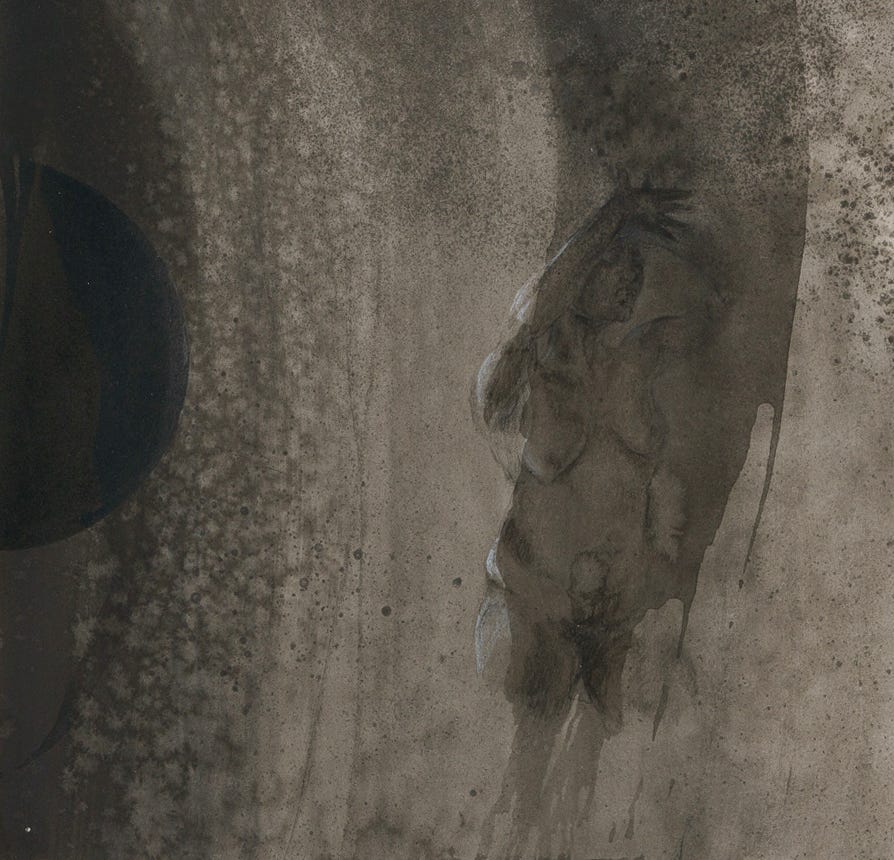I was recently interviewed by Beatrice Marovich, author of “Sister Death: Political Theologies for Living and Dying,” for the Columbia University Press blog. Beatrice and I are close friends and collaborators, and her book includes artwork of mine on the cover and throughout the book, as well as a Preface that explores how our friendship has co-shaped our respective bodies of work.
This exchange has taken me on a journey, as conversations with Beatrice inevitably do. I want to reflect, in this post, on one question from that Q&A that has opened a new portal of exploration for me. Here it is:
You can read the full conversation on the Columbia University Press blog, and more commentary from Beatrice on her Substack Gallactic Underworlds. I also highly recommend reading or listening to the lecture “Uses of the Erotic: The Erotic as Power” by Audre Lorde, in which she takes the erotic beyond the conscripted space of sex, evoking it as a powerful force in all of our lives that is inseparable from our work, our spirituality, and our drive towards social change. This is an important starting point for engaging with the erotic in my work.
My work takes as fundamental to existing in this physical world an eroticism that binds us into transformative relationships with one another. This eroticism is not limited to people we want to have sex with, nor is it limited to human-to-human interactions alone. Much of my thinking on the terrestrial dimensions of eroticism is inspired by eco-philosopher David Abram. In his book Becoming Animal, he evokes the eros of our very attraction to this planet, and of this planet’s attraction to us:
Yet this gravitational draw that holds us to the ground was once known as Eros — as Desire! — the lovelorn yearning of our body for the larger Body of Earth, and of the earth for us…Like the felt magnetism between two lovers, or between a mother and her child, the powerful attraction between the body and the earth offers sustenance and physical replenishment when it is consummated in contact.
After responding to Beatrice’s question, I realized that I have been experiencing some big shifts in how that eroticism shows up for me in my body and in my work. Before I go any further, here are a few images and a bit of background on the body of work Beatrice is referring to in her question, for those of you who aren’t familiar with the art I make.
My work from 2010-2020 focused on the erotics of bodies in transition. Disordered limbs grow and flower, heads blossom into ecosystems, dead birds grow human feet and walk away, fungus grows on an apple, an onion, a breast that leaks and decays and from this compost are birthed new arrangements of corporeality, spirituality, identity, power, sensation, sexuality, and survival. All over the paper, bodies are transformed by coming into contact with other bodies. These mergings depict life —human and more-than-human— as constituted by reciprocal relationships, relationships that are inherently erotic.
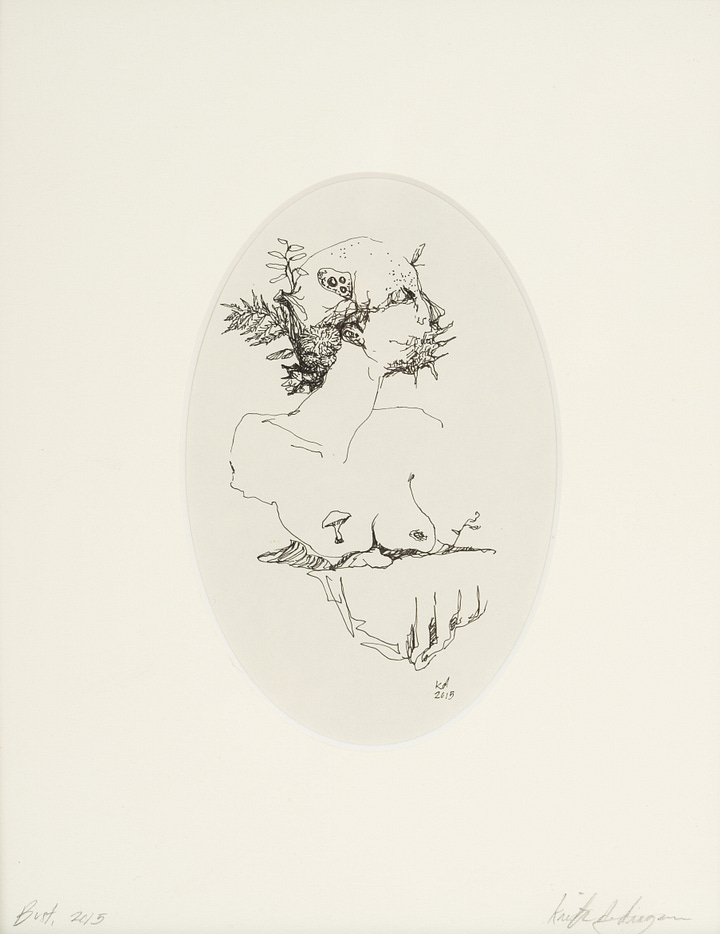
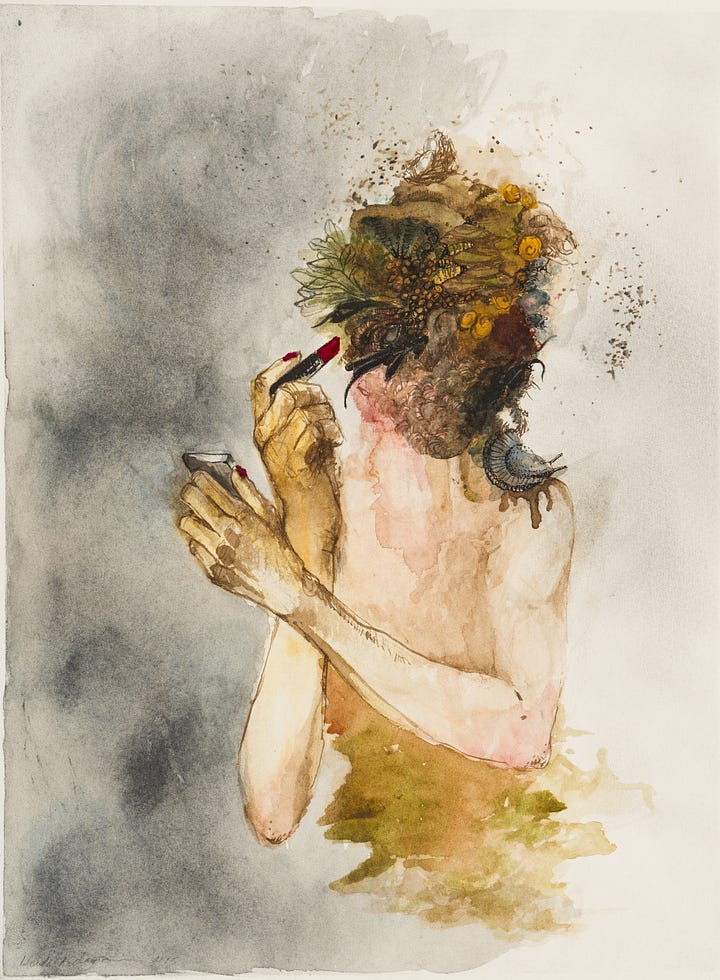
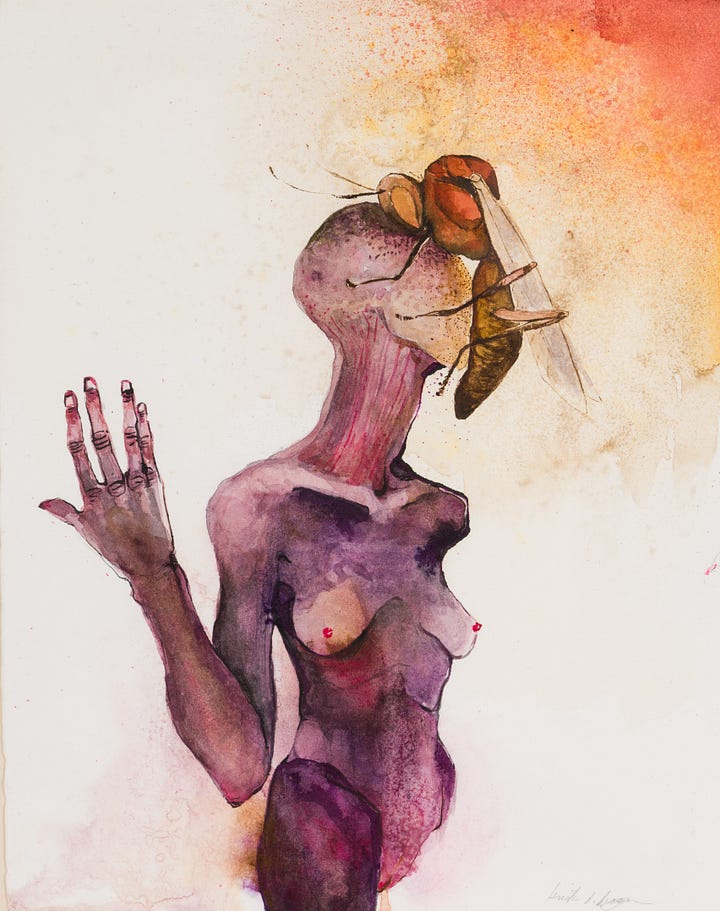

(pictured above: a grid of artworks in pen, watercolor, ink and watercolor pencil)
Andreas Weber, biologist, philosopher, and nature writer, names these transformative encounters as erotic ecology:
“Our body translates our constant material contact with the rest of the world into meaning. Matter that seeks to maintain itself in some particular, improbable, animate form —as do amoebas and hummingbirds, blue whales, and tardigrades— interprets the world of stuff and energy transfers into a world of meanings and subjective experiences. Matter that seeks to preserve its own existence, as metabolizing bodies do, thereby transforms the exterior world into an interior, world, constantly creating meaning out of touch. This is a fundamental aspect of erotic ecology.” Matter & Desire: An Erotic Ecology
In the winter of 2020-21, my work began to shift. In the deep shadows of the first pandemic winter, I tuned into darkness and space. I let my sense of presence and absence rearrange themselves and new perceptions emerged. Navigating and observing this strangely re-ordered world, I began to see slippages between figure and ground everywhere I looked and found myself questioning what it meant to perceive myself as a form at all.
My work became more deeply focused on sense perception, how the way we have been trained to use our senses shapes not only our perceptions but the relational ethics that ensue. Figures appeared less frequently in these works and when they did, it was as an edge, a termination line; the twilight zone between light and dark. I followed shadows, followed light as the Earth revolved around the sun. And as the summer returned, faded, and returned again, fewer figures appeared.

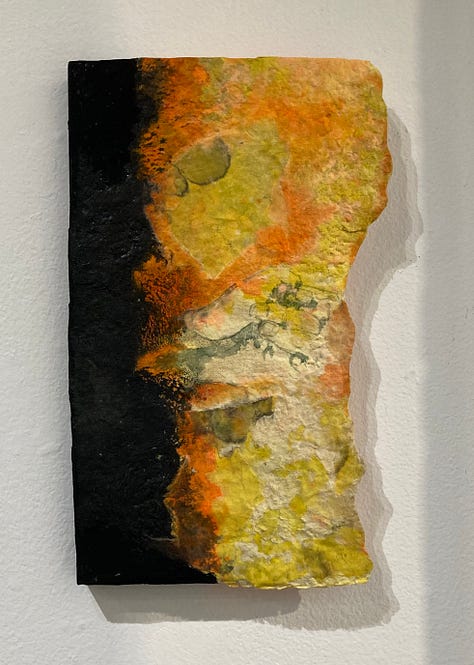
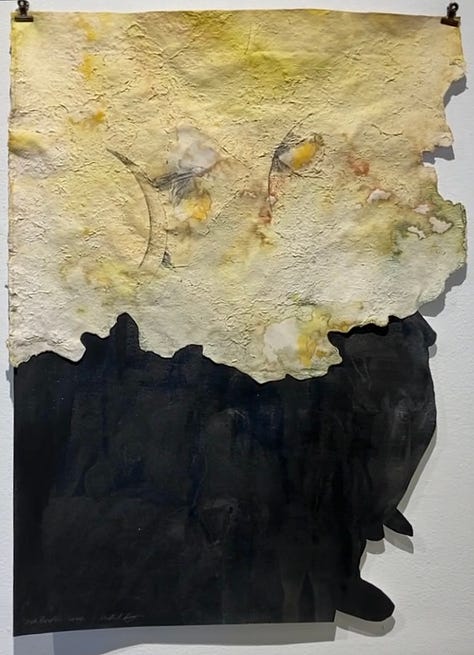


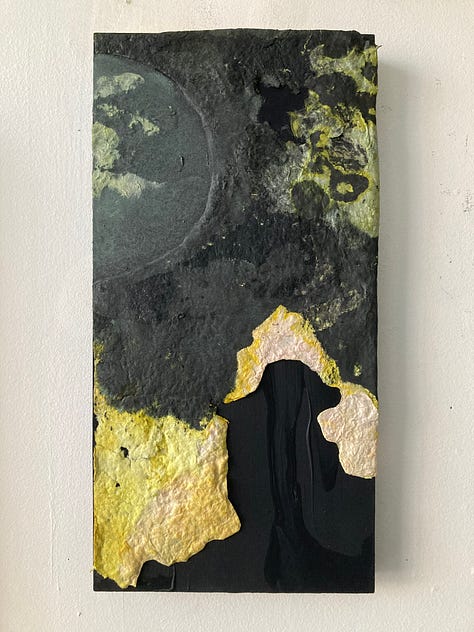
(pictured above: a grid of artworks made on wood, paper and canvas featuring an interplay of light and dark with some figuration)
Many people have asked why my work has become less figurative and my response has centered pandemic-induced isolation. But that answer hasn’t felt entirely satisfying to me. After I wrote these words —my body is held by a public gaze that wants to shape it in its own image of beauty and desire —it began to make sense. The reason I’m not foregrounding figures in my art is that I don’t feel that public gaze pressing against me, demanding my response. Let me explain.
I have always felt that gaze as an energy wave that hit me the moment I stepped out of my home. It shaped my experience of womanhood and became the way I navigated the world. Over the past few years, the intensity of that gaze has diminished. Yes, I still feel eyes on me at times, or the tension of psychosexual energetic exchange with strangers. But that energy now pools in moments rather than pushing and pulling me in oceanic tides.
There are a lot of possible causes for this shift. The COVID-19 pandemic has changed us all in ways we can not, as we are still being transformed by this organism, even begin to understand. And the technologies that hold our social world together have remade us in their own, ever-changing image. These are hugely significant factors, but as I sit here writing this, my body is registering the presence of an even more personal, and more ancient shift.
I’m a 46-year-old single woman. I have never birthed, nor have I desired to birth a child. My enfleshed body of energies and light has been carried in time, since that first bloodied entrance into womanhood, through other significant portals, all of which have, in some way, shaped and have been shaped by the river Eros. And now I am here, feeling the presence of another big mother portal. I am not in the medical sense “in menopause,” with its list of “symptoms.” But I don’t really believe in finite beginnings nor endings. We are always in a state of becoming, and that shift in me is happening now. I feel it like the presence of an enormous cave not yet in sight but scenting the air and coating my tongue with its minerality, my skin prickling with the change in temperature, hair coiling into new shapes with the changing balance of water and air, vision softening as I move towards that velvety darkness sparkling with crystalline beauty and deep earth fire.
Contrary to the reductive cultural narratives surrounding this period of time for female bodies that only portend dryness, dissatisfaction, and the greying out of desire, it is no less erotic to be in this body, this collection of organisms eating and permeating one another, expanding and transforming into other matter. Audre Lorde writes “When I speak of the erotic, then, I speak of it as an assertion of the lifeforce of women; of that creative energy empowered, the knowledge and use of which we are now reclaiming in our language, our history, our dancing, our loving, our work, our lives.” This assertion becomes more full-bodied as I am carried in time into new depths of encounter with this lifeforce. And yet there is this unmistakable absence.
A wise woman friend, responding to my pondering, said that this absence I’m feeling is due the difference between reflected power and actual power. When we are young, she said, we are not sure if we have any power. We didn’t feel it, didn’t recognize it until it came back to us through those culturally sanctified forms of power, through a patriarchal and capitalist gaze, a gaze which decides when and how much we get back, and requires that we enact specific kinds of desirability in return. Now, we don’t ask if we are powerful. We feel it regardless of the gaze. It requires no reflection. It is ours.
A power that requires no reflection for me to know it is there. Yesss, this feels like a piece of it, some true thing that helps me to understand myself in this moment. This power is there whether or not the external realities of my life reflect it back to me, no matter how disempowering the structures and conditions of my life are in a given moment. This power is there because it is part of that lifeforce that I now fully recognize as mine. This is also why it can feel so lonely. If I’m not sending this power out and asking for its return, that patriarchal, capitalist gaze is a whole lot less interested in talking with me.
Over the past few weeks, I’ve been testing out this theory. When I say, to anyone who asks about my different bodies of work, that I think I’m making different work now because I feel the exchange of psychosexual energy between myself and others has changed. And when I go on to say that I think this change is caused, in part, by the shifts that come with aging, I often get the immediate response you still look great! Or I sometimes get the flip side of that kind of response along the lines of yeah, we don’t give a shit anymore! Both of those responses, however well-meaning, attempt to answer a question that I am not actually asking. I’m not seeking out an affirmation of my desirability nor trying to dismiss desirability. Yes, emphatically yes, I want to be desired! What I am asking is how can I engage others in this gravity of eros as this powerful self when the terms of erotic exchange have been culturally created around my powerlessness?
So much of our experience of eroticism, for all genders, has been limited to negotiating access to particular forms of social power, our flirtations reduced to the question: do I have power over you? However much we may feel the erotic as an expansive force, we’re only allowed to acknowledge its presence on these terms. Living in these bodies contoured by cultural weight, I don’t think we ever really fully step out of these power negotiations. But we might, as we all continue to transform, ask different questions. The question I find myself asking in this moment is: if the basis of my erotic exchange in the public sphere isn’t a request for the power culturally bestowed upon maleness, then what other kind of erotic exchange can happen instead?
I realize now that this is what my work has been doing. I shifted my focus from foreground to background, from the figure to the space around it, to try to render those invisible forces that hold us in the shapes that we recognize as self and other. I have been asking how these forces might be experienced differently, how they might blind or blur our perceptions of these identities and roles, how they might release us into new experiences of transformative eros. My figures have gone beyond gravity and are now transforming themselves through contact with heavenly bodies, with the metaphysical void, and with the big vast space full of stars and time and black holes where all the light of our bodies have disappeared into mysterious, incomprehensible nothingness.
These are all the words I have for now. What comes next will come from some other expression of my ever changing and aging erotic self. I will thus leave you with one last quote from Audre Lorde:
“Within the celebration of the erotic in all our endeavors, my work becomes a
conscious decision - a longed-for bed which I enter gratefully and from which I rise up empowered.”








